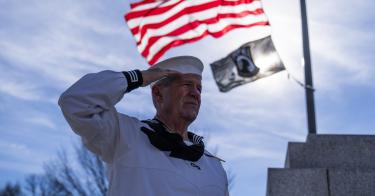December 7 was just another day on the calendar until 1941. But Japan’s devastating surprise attack on U.S. military bases in Hawaii seared that date into the American consciousness.
A terrible, unexpected tragedy can change history. Pearl Harbor Day brought America into the Second World War, just as 60 years later, the 9/11 attacks sparked a global war on terror.
And any date could be the next infamous moment in history. That’s something we should always keep in mind—particularly the people responsible for preventing future Pearl Harbors.
Here are four cautions that we should remember, not just on Pearl Harbor Day, but every day.
>>> Would China Dare Launch a Second Pearl Harbor on America?
1. Never think the unthinkable is unthinkable.
The last two years have given us powerful reminders that devastating surprise attacks are not a thing of the past. In 2022, most of the world was shocked when Russian tanks rolled into Ukraine. Two months ago, the world was stunned again by the brutal Hamas assault on Israel that murdered over 1,200 innocents.
In the aftermath of these attacks, it became apparent that intelligence services had received numerous warning signs but failed to connect all the dots. Just as was the case with Pearl Harbor, and 9/11.
Three days before the attack on Pearl Harbor, U.S. naval intelligence delivered a memo to the White House with intelligence that the Japanese were focused on Hawaii. The Israelis apparently had the Hamas battle plans a year before the attack.
Of course, it is a lot easier to connect the dots in retrospect, when you know which dots to connect. But that’s not much help in averting disaster.
The reality is strategic surprises happen. Responsible national security demands that we anticipate that horrific violence that we don’t want to think about can, in fact, happen. Never think the unthinkable is unthinkable. Biden thought he could pacify Hamas with aid. Biden thought he could scare-off Putin with threats of sanctions. But Biden had no Plan B for what to do when the worst that could happen happened.
2. Don’t whistle past the graveyard.
When Pearl Harbor was attacked, the world had already been at war for over two years. When you can see the world is already on fire, ruck up and get ready.
The FBI director recently testified that warning signs for an impending terrorist attack are everywhere. We ought to be on a war-level footing. We are not.
Biden still takes long weekends at the beach. Our border is wide open, with people streaming in—unvetted—from all over the world. And instead of trying to halt illegal entries, the administration is pulling Air Marshalls out of the sky and agents off the border to help process the flood of illegal aliens every day.
Overseas, the administration continues to engage Iran, the world’s largest state sponsor of terrorism, even as Tehran directs attacks against American troops in the region, empowers Hamas and Hezbollah, and fuels terrorist plots in Europe and Latin America.
3. Be prepared.
While we got caught short at Pearl Harbor, America was preparing for the gathering storm. In 1940, Washington mobilized 300,000 National Guard soldiers, adding 18 divisions and doubling the size of the Army. The Department of War completed the Victory Plan of 1941, a strategy to mobilize a military to defeat Germany and Japan.
Today, the U.S. military pays more attention to having enough drag queen shows on base than ensuring the armed forces can defend America’s interests. Arguably, woke policies have a higher priority than military readiness. Meanwhile, our intelligence, law enforcement, and homeland security agencies waste time checking out the political views of everyday Americans when they should be spending every moment hunting down America’s real enemies.
>>> The U.S. Military Went Woke. Time To Make Some Changes at the Top
4. Exercise righteous anger.
The day before Pearl Harbor, 80% of Americans opposed U.S. entry into the war. The day after, the overwhelming majority of Americans were ready to take on all the Axis powers.
In contrast, on the day after Oct. 7, many American college students took to the streets—to protest against Israel. They ignored the rape, torture, murder, and kidnapping of innocents, having been taught that it was the politically correct thing to do.
Subsequently, when hate crimes against Jews exploded in the U.S., the White House announced it was working a plan to combat… Islamophobia. What’s needed is leadership with moral clarity and righteous anger.
Today’s Washington is far from acting like it has learned the lessons of Pearl Harbor. Indeed, it appears to have learned nothing.
Ignorance is dangerous, not bliss. Unless our leaders wise up now, we can expect only that, when the next Pearl Harbor happens, they will be shocked, shocked! That’s just not good enough.
This piece originally appeared in Human Events




